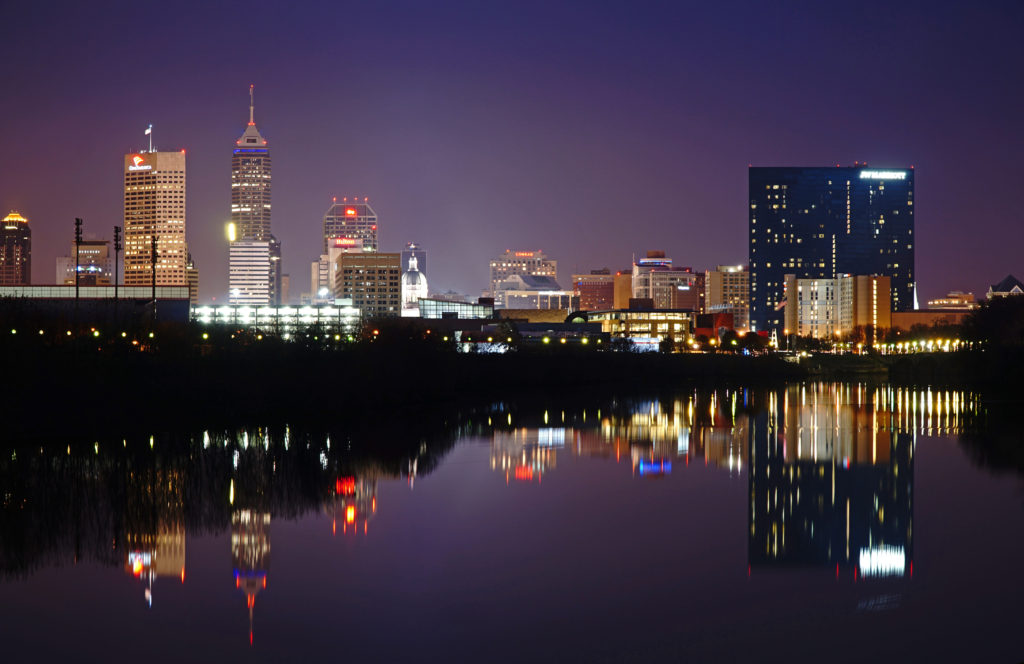The Obligatory City Skyline
Richard Bell1NOT to be confused with Keith Bell, another copyright plaintiff I blogged about recently. is a former attorney who took photographs of his law firm’s hometown, Indianapolis, particularly its skyline. There’s a natural connection between the practice of law and city skylines. By ironclad law, all small firm websites must feature the skyline of the firm’s hometown. Aaron | Sanders itself has been contacted numerous times about its egregious failure to feature the Nashville skyline on its website, and we continue to be defiant, even after we launched our new site.
To his credit, Mr. Bell took his own photographs of the Indianapolis skyline, rather than just rely on stock photographs. And to his further credit, Mr. Bell took good photographs of the Indianapolis skyline, including this nighttime one.

This pretty photograph of the Indianapolis night skyline was NOT taken by Richard Bell. I wouldn’t dare. No, this one was taken by “Miyin2” (really, Willie Medina) from White River State Park in November 2016, too late, alas, to be used on the spring 2015 conference brochure. Miyin2’s blog entry about his day in Indianapolis is here. Reproduced under Creative Commons 4.0 share-alike license.
Now retired, Mr. Bell has a new hobby: suing (or threatening to sue) folks for using his photographs of the Indianapolis skyline. There are lots of infringers; hundreds, he says. I think we can chalk this up to (1) unimaginative website design, and (2) that Mr. Bell’s photographs are a cut above the ordinary stock image.
Some of the many folks Mr. Bell went after were a guy named David Powell and the Midwest Regional Network for Intervention with Sex Offenders. The Network is a “non-profit professional network dedicated to reducing the incidence of sexual assault in our communities by intervening with the perpetrators.” I’m just going to call it the “Non-profit,” and we’ll stipulate that it does good, vital and difference-making work. The Non-profit holds two conferences a year2The next one will be November 9 in Beech Grove, Indiana, which is just an enclave within Indianapolis.. Mr. Powell was the executive director of the Indiana Prosecuting Attorneys Council (I’m just going to call them the “Council”), which was formed by Indiana’s state judiciary for the purpose of supporting state prosecutors.
As I’m sure it does for every conference, including the upcoming one, the Non-profit created for the Spring 2015 conference a brochure that can be printed and distributed physically, or accessed and downloaded as a PDF. Here it is. The conference was free for members to attend, and $35 for everyone else. The Non-profit wasn’t looking to make money from it, obviously, but it probably hoped the fees would offset some, if not all, of the costs.3I used to produce a non-profit conference, so I know the feeling. You’ll notice that in the upper right corner, where it says “April 24, 2015,” is a photograph of the Indianapolis skyline at night. Guess who took it?
To guess at how Mr. Bell’s photograph wound up on the brochure, we must resort to speculation. But it sure sounds as though Mr. Bell’s photographs were pretty widely available across the web by 2015. I’m guessing they were used on the website of Mr. Bell’s firm back in the early 2000’s, and over time, visitors who like the photos would download or screenshot them and put them up on photo-sharing sites, where they’d be further distributed. By the time the Non-profit encountered the Indianapolis Nighttime Photo, any watermarks or other identifying information would have been long gone.
Mr. Bell, however, maintains a website where you can purchase licenses to use his photographs and download high-res versions. Here, you can “buy” (i.e., license) his Indianapolis Nighttime Skyline photograph. (for commercial use, only $499 for a high-res version, and a mere $200 for “web size”!).
One way or another, the photograph wound up on the brochure, shrunk down perhaps, and altered by the placement of “April 24, 2015” and “ERNCE” (i.e., the last five letters of “CONFERENCE”) across it in white.
When Mr. Bell sued, the Non-profit argued that its use was fair. It’s just a little non-profit, after all, and its use was so, so obscure. Why are you picking on us? How do you think the court ruled?
Before you answer, remember that “I found it on the internet” is never, ever, ever fair use! Except, I guess, when it is, as two recent cases (which I blogged about) show.
Oh, before we move on: why in the world was poor Mr. Powell sued? Um. Well. His organization was asked to help promote the Non-profit’s Spring 2015 conference, so it provided and promoted a link to the brochure (which was still hosted by the Non-profit). Mr. Powell didn’t create the link—and linking, without more, is probably not even contributory infringement4Probably.—or even order it. He was just the executive director. Of an organization that’s an “arm of the state.” And you can’t sue5Almost literally. Yeah, you can sue, but the federal court will lack jurisdiction to hear the suit. the state for copyright infringement.
Anyway, make your guess and click here to find out whether the brochure’s use of Mr. Bell’s Indianapolis Nighttime Skyline photograph was fair or not.
Footnotes
| ↑1 | NOT to be confused with Keith Bell, another copyright plaintiff I blogged about recently. |
|---|---|
| ↑2 | The next one will be November 9 in Beech Grove, Indiana, which is just an enclave within Indianapolis. |
| ↑3 | I used to produce a non-profit conference, so I know the feeling. |
| ↑4 | Probably. |
| ↑5 | Almost literally. Yeah, you can sue, but the federal court will lack jurisdiction to hear the suit. |

